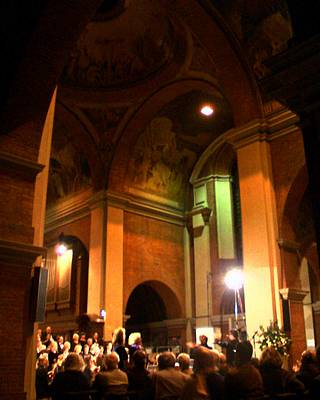|
<< -- 2 -- Keith Bramich CONGRESS OF PASSIONS

George Vass and Orchestra Nova began the concert with Benjamin Britten's light
and teasing Simple Symphony Op 4, written when the composer was barely into
his twenties, and based on some of the piano compositions of his youth. Britten
was rather dismissive of the work, calling it (in a letter to Welsh composer
Grace Williams) a 'school suite for strings',
but it clearly points the way forward to Britten's remarkable career. Nicely poised
playing from Vass's chamber orchestra here, especially in the 'Sentimental Sarabande',
the emotional heart of this piece. The sound carried well despite a large and lofty
church -- it's a venue used for recording by, amongst others, Naxos.

Ruth Peel, Rachel Nichols, Cecilia McDowall and George Vass with the Finchley Choral Society and Orchestra Nova in the church of St Jude-on-the-Hill, Hampstead Garden Suburb, London on 15 November 2003. Photo: Keith Bramich
|
The Finchley Choral Society was founded in 1903 with a simple brief -- to provide
opportunities for local people to study and practice music, and to provide concerts
in the Finchley area for the local community. One hundred years later, it's still
providing these opportunities and concerts, and the choir has celebrated its centenary
with three special events -- a summer concert at St John's Smith Square, this evening's
centenary performance and a year-long connection with Cecilia McDowall as Composer in
Association. The fruits of this association are a special commission from McDowall
for this new Magnificat, given its first performance here.

Cecilia McDowall. Photo: Patricia Dilkes
|
The opening 'Magnificat' section, for chorus, began solemnly with orchestra alone
and a bare and open feeling. The choir entered in unison, moving slowly towards harmony
and chromaticism, and ending with a wonderfully fruity soft final chord. Next came
the playful and lively 'Ecce enim ex hoc beatam' ('For behold, from henceforth all generations
shall call me blessed'), sung by soprano Rachel Nicholls (bright clean voice -- very
successful) in counterpoint with winds and strings. 'Quia fecit mihi magna qui potens
est' ('For he that is mighty hath magnified me') was a slow choral section, with a
kind of 'lapping' oboe punctuation at the start (later taken up by the women in the
choir). The men echoed the women, making for a complex dovetailed sound with shifting
tonality and a surprise ending -- the final high shimmering chord constructed from string
harmonics leaves some mysticism in the air. Mezzo-soprano Ruth Peel, with a rich,
dignified and slightly husky voice, sang the slow and reflective yet more dramatic
'Et misericordia'.

Acknowledgement for Cecilia McDowall at the first performance of her new Magnificat. Left to right: Ruth Peel, Rachel Nichols, Cecilia McDowall and George Vass, with members of the choir and orchestra behind. Photo: Keith Bramich
|
McDowall set 'Fecit potentiam' -- God's show of strength,
scattering the proud in the imagination of their hearts, as a soprano mezzo duet.
Nicholls and Peel blend well in this dramatic setting, based on a four note
motif, sometimes rising, sometimes falling. The music climaxed on the word 'superbos'
(the proud) and there's a kind of osmotic dispersal for the scattering ('dispersit'),
until (in the only segue in this six movement work), the choir
burst in with 'Deposuit potentes' for a grand and rousing finale, active music
describing the works of God and putting things to right, world without end, Amen.
Somehow I felt the closing pages of this glorious last movement needed a little extra
something from the choir -- more joy, more love, more commitment, maybe, and
certainly more volume (although as a large choir with a
small chamber orchestra there were some obvious balance constraints). An intriguing first
hearing of a new work, though, which, considering McDowall's popularity, will surely
be performed again.
Continue >>
Copyright © 17 November 2003
Keith Bramich, London UK

|

